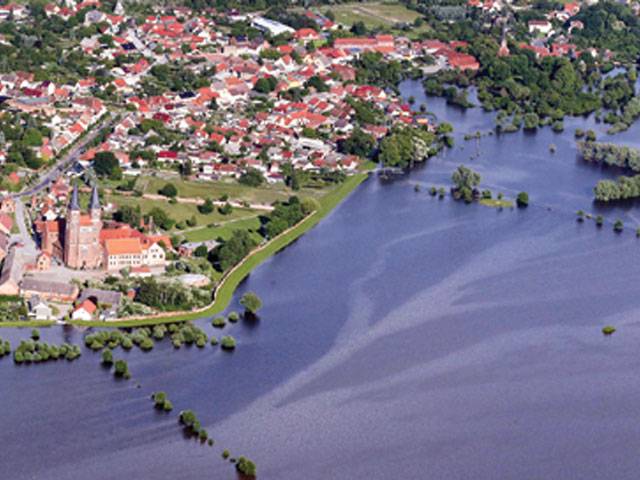BERLIN - Deadly floods forging a path of devastation through central Europe for more than a week bore down on northern Germany Tuesday as troops raced to bolster sodden dykes.
Swollen rivers in the German states of Saxony-Anhalt and Schleswig-Holstein posed the biggest threat, after flood waters caused billions of euros in damage and left at least 19 people dead across Europe.
Two burst dykes on Monday alleviated some of the pressure on other fortifications up the Elbe River, but around 9,000 soldiers were deployed in Saxony-Anhalt in the centre of the country to ensure they held as around 11,300 people remained out of their homes.
In Schleswig-Holstein in the north, fears focused on the town of Lauenburg, 40 kilometres (25 miles) southeast of Hamburg, where the Elbe was expected to peak on Thursday.
There the river has already reached a level of 9.56 metres (31.36 feet), more than double the normal.
The old quarter of the town had its power cut and some 400 people had to seek higher ground.
Downriver the Elbe stabilised as towns and cities remained in a state of alert, particularly in Magdeburg, the capital of Saxony-Anhalt, where more than 20,000 have had to seek emergency shelter.
Hungarians meanwhile breathed a sigh of relief as the level of the Danube continued to fall to 8.45 metres at 1200 GMT Tuesday from 8.81 metres late Monday.
Travel restrictions in Budapest were expected to remain in place for another week but a key bridge linking Hungary to Slovakia reopened to traffic.
Prime Minister Viktor Orban said his ministers would begin calculating the extent of the damage and hammering out a reconstruction plan.
“We still have a day and a half or two tough days ahead of us,” he said. “That is why we need to focus our efforts and attention in this time.”
Orban offered 1,000 soldiers to Serbia as it braces for its own influx.
Chancellor Angela Merkel made her third trip to the German disaster region on Monday and praised the “impressive” work of volunteers to keep the muddy waters at bay.
Economy Minister Philipp Roesler said Tuesday the government would establish an aid fund for stricken residents and businesses using a model established after “worst-in-a-century” floods in 2002.
“That was a success,” he told Berlin’s Inforadio, saying the amount of the new fund would be determined after the floods had passed and the cost of the damage had been tallied.
He had told rolling news channel NTV on Monday that those affected could expect a payout of 50 percent of their assessed damage.
Ratings agency Fitch said the latest deluge could be more costly than the 2002 catastrophe, forecasting 12 billion euros in damage in Germany alone, of which up to three billion euros would be covered by insurance policies.
The German Economic Institute (DIW) estimated in the middle of last week that the floods had already done six billion euros in damage.
Merkel, who is just over three months away from a general election and last week pledged 100 million euros in immediate aid, is to meet Germany’s 16 state leaders Thursday to discuss recovery efforts.
Meanwhile a staple of the German diet, the potato, looked to be another victim of the flooding as the fruit and vegetable industry association (BOGK) warned that a meagre harvest could drive up prices.
“It is not unlikely that there could be a shortage of French fries, dumplings and chips,” BOGK managing director Horst-Peter Karos told the daily Bild.
Saturday, April 20, 2024
Deadly floods bear down on northern Germany

8:27 AM | April 19, 2024
8:09 AM | April 19, 2024
Pak economy improving, funds will be provided on request: IMF
9:57 PM | April 19, 2024
Minister advocates for IT growth with public-private collaboration
9:57 PM | April 19, 2024
Judges' letter: IHC seeks suggestions from all judges
9:55 PM | April 19, 2024
Formula 1 returns to China for Round 5
9:05 PM | April 19, 2024
Germany head coach Julian Nagelsmann extends contract till 2026 World Cup
9:00 PM | April 19, 2024
A Tense Neighbourhood
April 19, 2024
Dubai Underwater
April 19, 2024
X Debate Continues
April 19, 2024
Hepatitis Challenge
April 18, 2024
IMF Predictions
April 18, 2024
Kite tragedy
April 19, 2024
Discipline dilemma
April 19, 2024
Urgent plea
April 19, 2024
Justice denied
April 18, 2024
AI dilemmas unveiled
April 18, 2024
ePaper - Nawaiwaqt
Advertisement
Nawaiwaqt Group | Copyright © 2024





